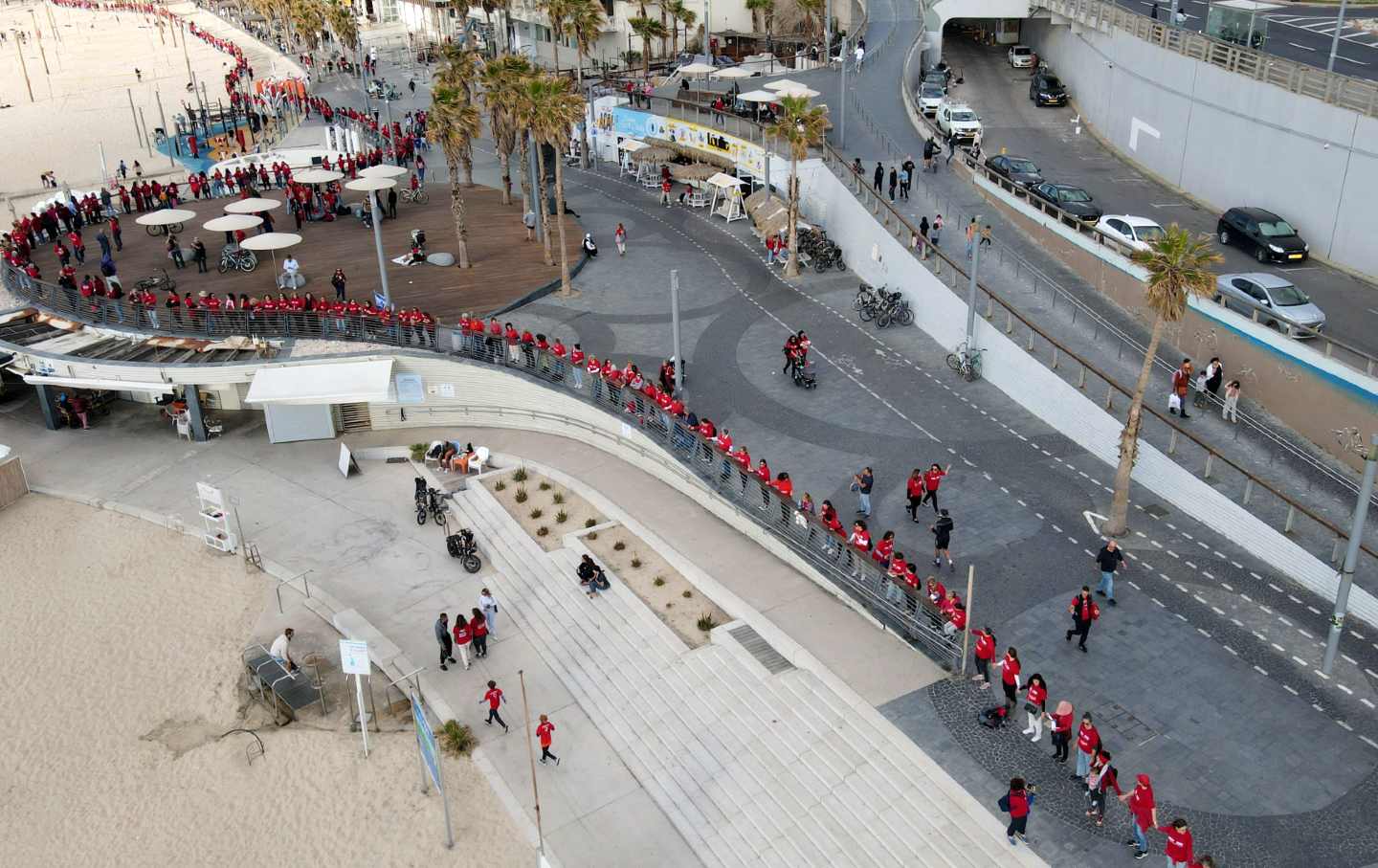Nationalism Distorts Feminism in Israel Just as It Did in the US
Israeli feminist groups showed courage standing up to Netanyahu on March 8, 2023. Where is that energy now that Gaza is starving?

Protesters supporting women’s rights are dressed in red as they form a human chain on International Women’s Day, in Tel Aviv on March 8, 2023.
(Jack Guez / AFP via Getty Images)“I am a person in this country,” the explorer Gertrude Bell excitedly wrote to her parents upon her arrival in Jerusalem in 1902. The meaning of her statement was clear: In Britain, even a white woman like her was a second-class citizen, not considered a full legal person. But in the colonial milieu of Palestine under the British Protectorate, she was suddenly above the brown men and women.
Witnessing the genocide in Gaza has brought me back to Bell’s telling statement. Between last year’s International Women’s Day and this one, I have seen Israeli feminists exhibit both inspirational courage and reprehensible silence. In January 2023, when the current Likud government was sworn in, I watched Israeli women speak out about the dangers that they would face under the right-wing government of Prime Minister Benjamin Netanyahu. I learned that one of the galvanizing issues was that Netanyahu promised to give rabbinical courts, who do not always recognize women as witnesses, jurisdiction over issues beyond divorce and inheritance. They were also to be given status equal to that of civil courts.
Clips of the nationwide protest held in Israel on March 8, 2023, showed an estimated 25,000 women dressed in red forming human chains in 70 locations across Israel. One protester told reporters that every aspect of Netanyahu’s proposed judicial reforms was retrogressive: “We are going to be deprived of all the rights and achievements that we managed to get so far, it’s really dangerous, and we’re not willing to accept that.” Included among the protesting women were women from Tel Aviv who said that the empowerment of religious Orthodox groups like the Haredi had already resulted in their being denied service in shops or the ability to travel on city buses. The protests proved that feminist groups in Israel were willing to risk arrest to make their protests heard.
It is precisely because of the strength illustrated by the Israeli feminist movement that its near-invisibility following October 7, 2023, has been such a shock and disappointment. Instead of trying to curb the government, many Israeli feminist organizations appear to have become agents of the state, just as vicious in their bloodlust as Netanyahu, whom they were protesting against mere months before. Much of Israeli feminism appears has been subsumed by “femonationalism,” a word coined by the sociologist Sarah Farris to describe the exploitation and co-optation of feminist themes by anti-Islam and xenophobic campaigns. Under femonationalism, feminist groups, like everyone else, are compelled to celebrate the “unity” prescribed by a militant nationalism.
This is reportedly the first time that female IDF soldiers have fought on the front lines—a privilege that some women have long litigated for and which appears to have been granted. Even before this, the strong Zionist woman in the IDF has been part of the country’s propaganda. There’s video from 2021 of female soldiers proclaiming themselves “just a bunch of empowered women defending their country,” then showing women piloting aircraft and toting guns. Videos like this are posted by Israeli influencers and sometimes by the IDF itself. They reveal how the IDF and its supporters try to use women fighters to cow feminists and others who may not agree with the equivalence of female militarism with female strength.
Female IDF soldiers are also being featured in propaganda by a mix of nationalist accounts such as SheSoldierStories that glamorize the brutal and cruel campaign against a trapped civilian population. Accounts like IDF Angels—a riff off the Victoria’s Secret Angels—shows beautiful Zionist female soldiers as a representation of a war that has killed 30,673 and injured over 72,043 Palestinian civilians. In most of the videos, soldiers appear in uniform and then in states of undress or in sexy clothes with shots of their cleavage and butts.
The women’s apparent euphoria at being conscripted to kill Palestinians is not unlike that of Bell over a hundred years ago. Most of these female IDF soldiers in propaganda accounts are Ashkenazi Jews—these are white women shown as proud to be participating in attacks killing brown men, women, and children.
What is the Israeli feminist position on all of this? It’s impossible to say, since no major Israeli feminist organization has made a statement about the sexualization of women to further mass killing and repression.
In the end, Israeli women will be harmed by this, too—though perhaps not during the campaign but after it is over.
The proof of this lies in the US experience in the War on Terror, which similarly appropriated feminist lingo, ideas, and agendas to paper over invasions and occupations. After September 11, 2001, femonationalism seized the United States. When first lady Laura Bush said that America was invading Afghanistan to liberate Afghan women from the Taliban, few questioned her. The Feminist Majority Foundation, one of the largest women’s organizations in the United States, attended the State Department ceremony in which the invasion was announced. Gloria Steinem who had famously handcuffed herself to a chair to protest the Vietnam War, made statements in favor of democracy promotion. Many white feminists lined up to cheer the killing of people who had nothing to do with 9/11.
A decade later, the myth persisted in CIA-aided film. In the 2012’s Zero Dark Thirty, a pale, white—whiteness being a key aspect of the neocolonial warmongering of the last two decades—Jessica Chastain played the ultimate femonationalist, a fictive composite of a group of CIA women we are told were behind the Osama bin Laden raid in May 2011. In the movie’s opening scene, she exhibits her steely resolve for catching terrorists by participating in a water boarding of a brown man—much to the admiration of her male colleagues.
During the War on Terror, the US feminist movement was not sufficiently concerned about how this femonationalist version of itself would damage women’s ability to take on important issues in the future. When the #MeToo movement emerged—sparked by the work of Black feminist Tarana Burke—many men in the media industry were outed and lost their jobs. But a good many of the them escaped criminal charges and were able to get new, often better, jobs. This was because in the two decades of the War on Terror, there was not enough legal and policy progress concerning women’s rights at home. With feminist liberation now a US export, too much attention was paid to white-feminist saviordom abroad.
Popular
“swipe left below to view more authors”Swipe →Since the femonationalist fever of the post-9/11 era, feminists in the US have lost ground. In summer 2022, a conservative Supreme Court, its newest three members appointed by a president that talked about grabbing women’s pussies and has since been found liable for rape, overturned Roe v Wade. Fourteen states have now passed full abortion bans, some of which do not even have exceptions for rape or incest. Last month, a study revealed that in these states 65,000 pregnancies had resulted from rape, because survivors were forced to have the children.
Nationalism, by definition, suggests that the nation is great and precious, and so attention must go not to exposing the rot within but to fighting the enemy without—in this case a Muslim and brown enemy. Femonationalism merges this with the idea of women’s empowerment to say that American women are already strong and free and must look to liberate Muslim women in Afghanistan. I believe this helped obscure the threat to women of growing religious fundamentalism in the US.
Since the war on Gaza began, the only thing some Israeli Zionist feminists have spoken about is their outrage that the world’s feminists did not condemn the atrocities that occurred during the Hamas-led attack on October 7, 2023. This is incorrect; I do not know of any large international institutions that have not spoken out about the crimes that took place that day. The sense of outrage experienced by many Zionist feminists reveals just how the heady mix of military might, historical entitlement, and settler-colonial values can warp a movement.
When Israeli Zionist feminists were organizing for their rights, some were frustrated by the feeling that many Palestinian women living in Israel were not interested enough in their protest against the rabbinical courts. When an Arab activist was questioned about this, she noted that many Palestinians living in Israel (about 20 percent of the population) already faced so much discrimination—not being permitted to travel through towns, to avail public services, to own homes, and so much else—that it was difficult for them to join a campaign that could likely land them in jail more easily than other protesters.
The incident reminded me of one from colonial India. Not long after they won the vote in 1920, some British women headed to the subcontinent to instruct women how to organize to get the vote. They were frustrated when Indian women showed little interest in the issue, but they kept pressing until finally one Indian activist told them, “We do not want to be equal to brown men, because they, like us, are under your yoke.” When they were free of British occupation, she told the British women, then they would also have the vote.
Israeli female soldiers walking into a starving, thirsty, and despairing Gaza to further terrorize women and children at gunpoint is no act of bravery or courage. It takes brave women to see injustice beyond self-interest and to serve as a check on militarist and patriarchal institutions. Instead of Israeli feminist groups calling on the world to stand up for them, I’m asking Israeli feminists to stand up for Gaza. The feminist movement as a whole will benefit if we resist femonationalism wherever it takes root and if we understand that being a woman means refusing to believe that one particular group of women is more worthy than any other.
More from The Nation

The Fall of Syria Changes Everything The Fall of Syria Changes Everything
Retired diplomat Chas Freeman and writer Pascal Lottaz discuss what happens now that Damascus is in the hands of Hayat Tahrir al-Sham.

Netanyahu Must Be Brought to Justice. But We Can’t Stop There. Netanyahu Must Be Brought to Justice. But We Can’t Stop There.
This genocide is a massive criminal undertaking, and we must hold as many of its perpetrators accountable as we can.

My Brother Chef Mahmoud Almadhoun Died Because He Fed Gaza’s Starving Citizens My Brother Chef Mahmoud Almadhoun Died Because He Fed Gaza’s Starving Citizens
His killing by Israel sent a chilling message that no one is safe, including humanitarians who stand in the way of Gaza’s erasure.

The Underground Network Helping Gazan Refugees Survive in Egypt The Underground Network Helping Gazan Refugees Survive in Egypt
A patchwork of volunteer-run mutual aid organizations has sprung up to tackle the severe problems facing people fleeing genocide.

The Dangers of Trump’s Foreign Policy The Dangers of Trump’s Foreign Policy
Strategic incoherence and factionalism reign.

Macronism Has Died a Second Death Macronism Has Died a Second Death
The French parliament votes to oust the government.


